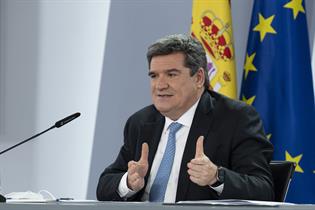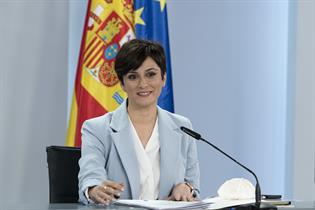Council of Ministers
The Government of Spain approves a 2.5% increase in contributory pensions and a 3% increase in non-contributory pensions in 2022
Council of Ministers - 2022.1.25
Moncloa Palace, Madrid
The Council of Ministers has approved the revaluation of pensions for the year 2022, which involves a 2.5% rise in contributory pensions and State Pensioners' Pensions and a 3% increase in minimum and non-contributory pensions, including the Minimum Subsistence Income. A compensatory payment for last year's inflation deviation has likewise been approved.
The Minister for Inclusion, Social Security and Migration, José Luis Escrivá, explained that the government had earmarked 6.5 billion euros for this revaluation and that 11.5 million pensioners would benefit from it, with effect from 1 January, and "be able to maintain their purchasing power".
Escrivá stressed that this increase in pensions had been made for the first time in accordance with the provisions of Act 21/2021, of 28 December, on Guaranteeing the Purchasing Power of Pensions and other Measures to Strengthen the Financial and Social Sustainability of the Public Pension System, which came into force on 1 January and resume the annual Consumer Price Index (CPI) as the index for revaluation.
More specifically, the 2.5% increase approved for 2022 corresponds to the average inflation of the last twelve months up to November 2021. The compensatory payment, on the other hand, was approved because inflation between January and November 2021 had exceeded the forecast which pensions that year had been revalued with (forecast at 0.9%, with inflation at 2.5%).
New framework of certainty for pensioners
 Foto: Pool Moncloa/Borja Puig de la BellacasaThe minister stated that the new framework for pensions offered absolute certainty to pensioners and guaranteed their purchasing power "indefinitely and at all times", compared to the previous system which had "put the emphasis on cuts and austerity".
Foto: Pool Moncloa/Borja Puig de la BellacasaThe minister stated that the new framework for pensions offered absolute certainty to pensioners and guaranteed their purchasing power "indefinitely and at all times", compared to the previous system which had "put the emphasis on cuts and austerity".
For her part, the Minister for Territorial Policy and Government Spokesperson, Isabel Rodríguez, said that the reform made it possible to "move from an imposed system to an agreed pension system in the field of social dialogue and in accordance with the Toledo Pact".
She pointed out that 13 of the 21 recommendations set out under the Toledo Pact towards the end of 2020, most of which were included in the reforms of theRecovery, Transformation and Resilience Plan, had already been met by the government and that the remaining ones were in progress.
Reducing the Social Security deficit
The minister affirmed that progress was being made towards balancing the Social Security budget. The estimate for closing the Social Security deficit in 2021 is 1%, two tenths of a percentage point below the initial forecast, which allows the deficit target for 2022 to be set at 0.5%.
The main reason for this reduction was the strengthening of social security revenue. social security contributions in 2021 represented 132 billion euros in revenue, 10% more than in 2020 and 6% more than before the pandemic, thanks to the considerable rise in employment - with an extra 400,000 registered contributors - and the maintenance of wages.
"If we measure it in terms of GDP, in relative terms, we are at an absolute record, it is 11% of GDP in revenue from social security contributions," continued the minister, comparing the figure with 2008: "In the best year before the financial crisis, it was a point and a half below".
The second mechanism contributing to the elimination of the deficit, Escrivá pointed out, was that the General State Budget had been absorbing most of the "improper expenses" - non-contributory public policy expenses financed up to now by the Social Security - specifically 13.8 billion euros in 2021 and 18.3 billion euros in 2022.
Minimum Subsistence Income Monitoring Committee
The Executive has regulated the organisation and functions of the Minimum Subsistence Income Monitoring Commission (Comisión de Seguimiento del Ingreso Mínimo Vital - IMV), an administrative cooperation and governance body that will be responsible for monitoring the application and implementation of these benefits.
The Commission is attached to the Ministry of Inclusion and includes representatives of the State's General Authority, Autonomous Communities and municipalities.
The goal, according to José Luis Escrivá, was to work together and "ensure that the beneficiaries of the IMV, who are the most vulnerable and in a situation of social exclusion, can enter socio-occupational integration pathways and move on to a better situation in society".
Support for business solvency
 Foto: Pool Moncloa/Borja Puig de la BellacasaThe Government has authorised a new operation from the Fund for Supporting the Solvency of Strategic Companies , aimed this time at the Abades hotels, restaurants and cafeterias group, for 29.3 million euros. This consists of a 22.8-million-euro shareholder loan and a 6.5-million-euro ordinary loan.
Foto: Pool Moncloa/Borja Puig de la BellacasaThe Government has authorised a new operation from the Fund for Supporting the Solvency of Strategic Companies , aimed this time at the Abades hotels, restaurants and cafeterias group, for 29.3 million euros. This consists of a 22.8-million-euro shareholder loan and a 6.5-million-euro ordinary loan.
Isabel Rodríguez explained that the group provided an important chain of services along the road networks of Andalusia and other parts of Spain. Its economic impact was significant, especially in Andalusia, as it provided more than 1,000 direct jobs and boasted a turnover of around 100 million euros a year. More than 7,000 people depended on the group, if we included households and indirect jobs.
National Commission for Expo Malaga 2027
The Council of Ministers has agreed to create a National Commission, chaired by the Ministry of Foreign Affairs, European Union and Cooperation, to support the city of Malaga's host-city candidacy, in 2027, for the International Exposition on the Urban Era towards Sustainable Development.
Rodríguez pointed out that the government shared its goals under its commitment to sustainable development and to the 2030 Agenda.
Non official translation





